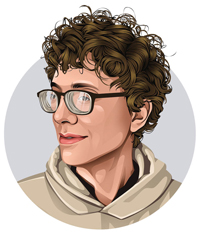
They had beta software, big goals, and a keen sense of what their technology could be. But for Jason Ganz, Kogod/BSBA ’14, and his Agora cofounders, the future didn’t arrive quite fast enough.
The start-up drew inspiration in 2014 from the virtual reality (VR) company Oculus, which had sold to Facebook for $2 billion the same year. Ganz and his classmates, members of the inaugural AU Center for Innovation incubator cohort, pondered ideas on their couch for a week before pulling their technological change—a VR meetings and lecture software—from the cushions.
For three years, the Boston native sank 30 hours a week—on top of his budding analytics career—and endless enthusiasm into Agora. Ganz and cofounder Matthias McCoy-Thompson, SIS/BA ’14, pitched VR relentlessly to potential customers across the DMV, formed the still-active DC Virtual Reality Meetup Group, and generated mild investor interest. But “we all knew that this was a very ambitious scope,” Ganz says, and a stop sign eventually appeared on the horizon. A concept perfect for a remote 2020 just wasn’t ready in 2017, and Agora called it quits.
“Our sense was that this was a great idea, but the tech wasn't going to move as quickly as we thought it would,” he says. “We didn't want to spend the next five years not being able to do anything and waiting for it to pop.”
Ganz reflects, though, with gratitude from his perch at another start-up, Philadelphia-based Dbt Labs, whose analytics engineering tool earned it a $150 million series C funding round this summer. The Agora years prepared him to navigate a rapidly changing industry (and a brand-new job title, developer experience manager), project calm in big meetings, and break down nebulous ideas into digestible chunks.
Agora is among the 50 percent of small businesses and start-ups that don’t make it to the five-year mark, yet Ganz “wouldn’t change a thing.” He made lasting memories while trying valiantly to transform a far-out idea into a virtual reality.